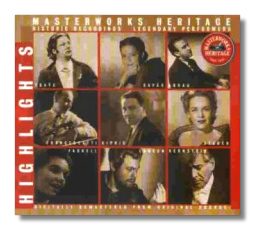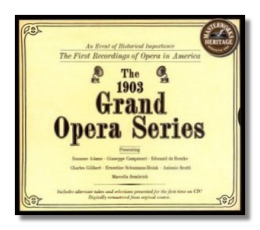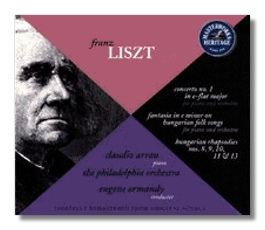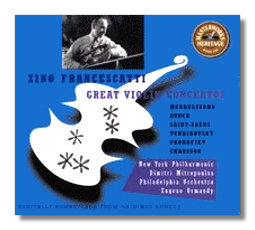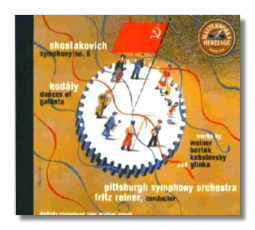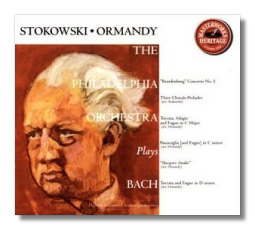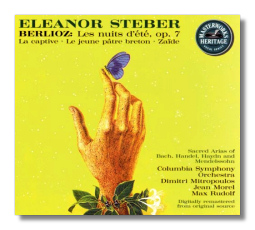
The Internet's Premier Classical Music Source
Related Links
- J.S. Bach Reviews
- Latest Reviews
- More Reviews
-
By Composer
-
Collections
DVD & Blu-ray
Books
Concert Reviews
Articles/Interviews
Software
Audio
Search Amazon
Recommended Links
Site News
 CD Review
CD Review
Masterworks Heritage
Sony Classical Reawakens "Sleeping Beauties" From Earlier Eras Of Recording
[ Sampler MXK62817
Amazon
- UK
- Germany
- Canada
- France
- Japan
]
Sony Classical issued the first ten titles in their handsome new "Masterworks Heritage" series late last year, and another eight titles (plus a sampler, MXK62817) are scheduled for release on January 14. The series is designed to present popular or historically important recordings that were originally released on the Columbia Masterworks, CBS, and Epic labels. Many of these recordings have not been released on CD yet – for unfathomable reasons. For the earlier recordings (i.e., those that were recorded before the advent of the tape masters, and usually first released on 78rpm discs), Sony's engineers have searched for mint-quality shellac pressings, or for metal masters or lacquers made in the recording studios. The sound on these discs has been meticulously cleaned-up with the CEDAR noise-reduction process and with Sonic Solutions NoNoise software. For later monaural and stereophonic recordings (apparently the series will go right up to the digital age), the engineers are using tape masters and high-tech playback equipment that allow great flexibility during the remastering process. Sonic Solutions again has been used to transfer the material to a 20-bit digital format. So far, the results have been impressive, retaining (and, in some cases, uncovering) all the impact of the original discs while removing their incipient perils.
The presentation is nice too. Jewel boxes have been rejected in favor of book-format packaging. The CD itself slips neatly into a pocket that's the last page of the "book," and, as with Deutsche Grammophon's "Originals" and RCA Victor's "Living Stereo" series, the look of the original record labels has been retained on the disc. For example, recordings from the early 50s are pressed on CDs with labels that mimic that era's dark-blue Columbia labels, and recordings from later in the decade are pressed on CDs bearing the "6-eyes" motif. Even the CD pocket is imprinted with inner sleeve art and copy that is characteristic of the era in which the recording was first released. Original cover art has been used too. No doubt these relatively minor details will strike responsive chords with collectors who breathe a little faster and whose hearts pound a little harder at the prospect of desirable used records.
[ MH2K62334
Amazon
- UK
- Germany
- Canada
- France
- Japan
]
Sony sent me six of the first ten titles, and I'd like to share my very positive reactions overall. (Not sent were MHK62355: Bidu Sayao sings French operatic arias and Brazilian folk songs; MHK62337: the complete violin recordings of Eugène Ysaÿe, plus samplings of his work as a conductor; MH2K62349: George Szell and the Cleveland Orchestra playing Robert Schumann's four symphonies and the "Manfred" Overture; and MHK62353: antiphonal music of Gabrieli played by the brass of the Philadelphia, Cleveland, and Chicago Symphony Orchestras.) MH2K62334 brings back "The 1903 Grand Opera Series," a two-LP release from 1963, with some extra material recorded between 1905 and 1907. These discs are purported to preserve "the first recordings of opera in America." Seven singers were included in this series, each of them a star of the Metropolitan Opera House. The original discs were sold for the (then) royal price of $2.00 each, and bore "the personal signature of the singer" – Suzanne Adams, Giuseppe Campanari, Edouard de Reszke, Charles Gilibert, Ernestine Schumann-Heink, Antonio Scotti, or Marcella Sembrich. Most of the recordings were made in double takes, and Columbia (and now Sony), perhaps unnecessarily, have included both for comparison. The historical value of this collection is self-evident, but will it play in latter-day Peoria? Most salient are not only the documented changes in vocal style, but the changes in taste, repertoire-wise. At the time, many aficionados considered Charles Gounod the greatest operatic composer ever, and that is reflected in the selections here. Crossover could be pretty vile then, too – try "Obstination," in recordings by two different singers, yet. The presentation is lavish, down to a reproduction of Columbia's original promotional brochure. The engineers did good work in bringing these discs first to LP and now to CD, but it is impossible to forget that these are ninety-year-old recordings. Still, there are many who will want to reheat these frozen morsels of time. This material is new to CD.
[ MH2K62338
Amazon
- UK
- Germany
- Canada
- France
- Japan
]
On February 17, 1952, pianist Claudio Arrau, conductor Eugene Ormandy, and the Philadelphia Orchestra recorded Liszt's First Piano Concerto in a single-take. "Well, what is there to say?," asked Ormandy. "We're done. It can't be better than this." Fans of Martha Argerich, for one, might take issue with Ormandy's statement, but there's no denying that this performance (plus the "Hungarian Fantasy" taped the same day) has only infrequently been matched. Here's display with the brains and heart intact. Arrau in the 1970s and 1980s was an elder statesman figure who was admirable to younger collectors for his weighty interpretations of Beethoven, Chopin, Mozart, Schubert, and Debussy, as well as Liszt, so this collection is a reminder that Arrau still had plenty of virtuoso juice left in him when he was in his fifties. This CD, MHK62338, is completed by roughly contemponeous recordings of Liszt's Hungarian Rhapsodies #8, 9, 10, 11, and 13. All I can add is that I am glad that Arrau turned his attention to the Hungarian composer's better works in later recordings for the Philips label. This material is completely new to CD as well.
[ MH2K62339
Amazon
- UK
- Germany
- Canada
- France
- Japan
]
French violinist Zino Francescatti has been horribly ignored in the digital era, probably because, in general, his most important recordings were made just before stereo was commonly used. By the time that this technological advance became entrenched, Columbia had chosen Isaac Stern as its fair-haired fiddle-playing boy. Masterworks Heritage MH2K62339 presents Francescatti in concerto recordings dating from 1950 to 1954; the composers are Mendelssohn (the E Minor Concerto), Bruch (the First, in G minor), Saint-Saëns (the Third, in B minor), Tchaikovsky, Prokofieff (the Second, in G minor), and Chausson ("Poeme"). In all but the Chausson, the violinist was paired with the great Greek conductor Dimitri Mitropoulos and the New York Philharmonic. (Ormandy and the Philadelphians partner Francescatti in the "Poeme.") It turned out to be a good combination. Francescatti and Mitropoulos were exciting and emotional performers who never let their virtuosity freeze or constrict the music's heart. Compare this Tchaikovsky – taped in 1954 – with the justifiably acclaimed Heifetz/Reiner RCA version from three years later and you will find that although the Columbia team's technical prowess yields (but not very much) to RCA's, Francescatti and Mitropoulos are ultimately more human and involving. With so many excellent recordings of these works on the market, it wouldn't be fair to say that Francescatti's are the best, but his performances will be deeply satisfying for those who are looking for a compromise between genuine emotional warmth and technical fire… a compromise that Heifetz seldom is capable of offering.
[ MH2K62343
Amazon
- UK
- Germany
- Canada
- France
- Japan
]
Speaking of Fritz Reiner, his work with the Chicago Symphony Orchestra has been issued and reissued to death, but his work with the Pittsburgh Symphony Orchestra has barely been touched. The conductor, a notorious taskmaster, was able to build the Pittsburgh ensemble almost to Chicago's advanced level, and his programming, at least as preserved on disc, was somewhat more adventurous than it would be when Reiner moved to Chicago. The centerpiece of MHK62343 is Reiner/Pittsburgh's 1945 recording of Shostakovich's Sixth Symphony. This is a work that Reiner performed earlier with the New York Philharmonic (a pirate of this interesting performance was on AS Disc AS 628), and it's interesting to see how the conductor sped up the first movement over course of about eighteen months: from 21:30 in the summer of 1943, to 18:27 in the present recording. Having said that, Reiner's Shostakovich now seems quaint and not completely understanding, as with Toscanini's broadcast recordings of the First and Seventh Symphonies. A true Shostakovich style among conductors was still a decade or two away. The Masterworks Heritage disc is completed by a blazing recording of Kodály's "Dances of Galánta," Kabalevsky's "Colas Breugnon" Overture, Bartók's "Hungarian Sketches" (both Reiner specialties that he would remake in Chicago), Glinka's "Kamarinskaya," and, most interestingly, Leó Weiner's Divertimento #1 ("on old Hungarian dances") for String Orchestra. (There's a work that has practically disappeared from recordings, to say nothing of concert programs.) These substantial fillers, then, all recorded between 1945 and 1947, are more attractive than the main course, and are a good reason to acquire this CD.
[ MH2K62345
Amazon
- UK
- Germany
- Canada
- France
- Japan
]
Purists will assert that the Philadelphia Orchestra has no business playing Bach. It's too bad they feel that way, particularly when the conductor is Leopold Stokowski, reunited with the orchestra after a hiatus of almost two decades. Ormandy invited Stoki back in 1960, and MH2K62345 documents the results: confident, suave recordings of the Fifth Brandenburg Concerto and the conductor's moving arrangements of three Chorale Préludes. Ormandy was an expert arranger and conductor of Bach himself, as can be heard from the balance of this 2-CD set, which contains what used to be Columbia MS6180 ("Bach by Ormandy" – also recorded in 1960) and MS6342 ("The Bach Family" – works by Johann Christian, Carl Philipp Emanuel, and Wilhelm Friedemann Bach, recorded in 1957). None of it may be "authentic," but it all sounds luscious enough to make new friends for the music and the performances.
[ MHK62356
Amazon
- UK
- Germany
- Canada
- France
- Japan
]
Eleanor Steber and Dimitri Mitropoulos take risks in Berlioz's "Les nuits d'été" (MHK62356): Steber's voice is hardly French-sounding, and Mitropoulos's tempos might sound better suited to "Parsifal" than to Berlioz, but this is a recording that works powerfully, in spite of the odds. The plaintive and quick vibrato in Steber's upper range complements the chesty (but never matronly) warmth in her lower range, and together, she and Mitropoulos ensure that the score is even more the quintessence of Romanticism than it usually is. With conductor Jean Morel, Steber makes something really memorable out of three more of Berlioz's songs ("La captive," "Le jeune pâtre breton," and "Zaïde"), and with conductor Max Rudolf, she overcomes lumpy orchestral accompaniments and is spiritually stirring in five sacred arias by Bach, Handel, Haydn, and Mendelssohn. Of the six discs described here, this is my favorite. None of this material has previously been on CD.
The eight January releases already scheduled for release are comprised of four vocal discs (Alexander Kipnis, Richard Tucker, Eileen Farrell, and George London); Mitropoulos conducting Mahler's First Symphony and Rachmaninoff's "Isle of the Dead"; Mozart and Beethoven symphonies conducted by Reiner; Leonard Bernstein conducting Milhaud's "Les Choephores," Roussel, and Honegger; and Thomas Schippers conducting Barber. Beyond those, eighteen more Masterworks Heritage discs are promised. Not all titles have been identified, but it looks like they will include Beethoven played by the Budapest String Quartet, Mitropoulos's landmark recording of Berg's "Wozzeck," the Met "Bohème" with Sayao and Richard Tucker, and Ljuba Welitsch's complete recordings for Columbia. Sounds great, but I wish I had some input myself. Off the top of my head, I'd like to see reissues of Marie Powers's recording of Menotti's "The Medium"; Dorothy Kirsten's operatic recordings; Dimitri Mitropoulos conducting Schoenberg's "Transfigured Night," Vaughan Williams' Fantasia on a Theme by Thomas Tallis, and Scriabin's "Poem of Ecstasy"; Schippers conducting "Alexander Nevsky"; Bernstein conducting Debussy's "Martyrdom of Saint Sebastian" – with great declamation by actor Fritz Weaver!; and more of the Budapest String Quartet's work from the 50s. I'm sure many of you who have read this far have suggestions of your own.
Copyright © 1999, Raymond Tuttle.













